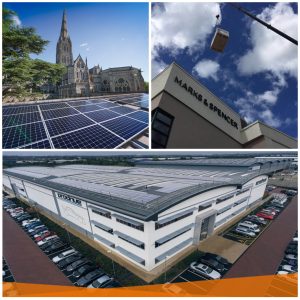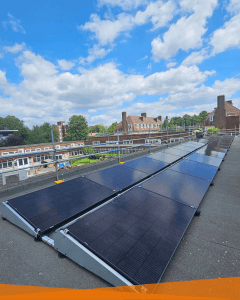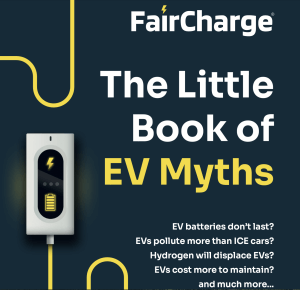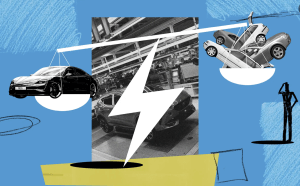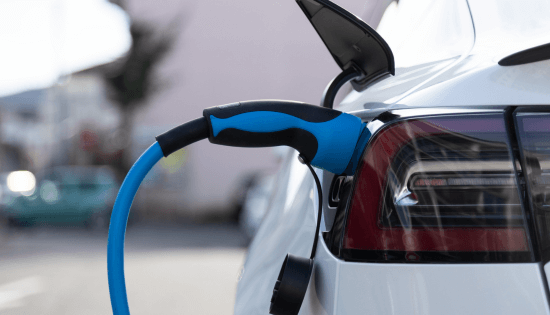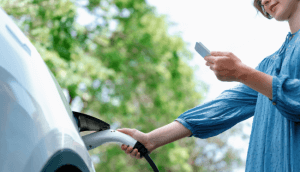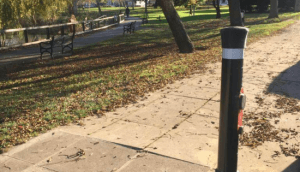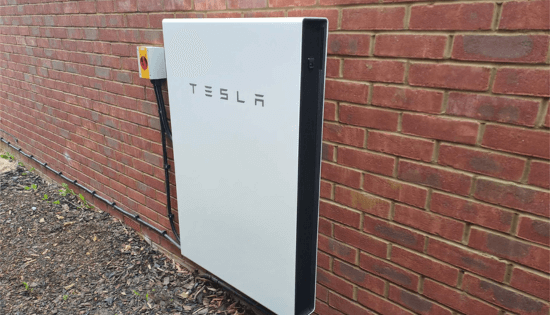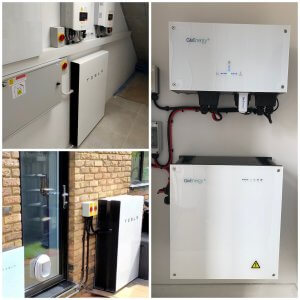October 2, 2023
In
News and Events
myenergi, who make the zappi smart EV charger and eddi hot water diverter, have made their products compatible and configurable with batteries.
Why is this good news? Well, not all smart EV chargers and solar hot water diverters are compatible with home battery storage, and using incompatible products can lead to odd things happening with your setup. You may find your home battery is discharging surplus energy into your hot water tank when you don’t want it to, for instance!
Getting your priorities right
The main products that can be installed alongside a solar array all perform a similar function. They control the storing of solar energy for use later on.
Home batteries divert surplus solar into a static battery wired to your house for use at night.
Smart EV chargers divert surplus solar into your car battery or can fast charge.
Hot water diverters divert surplus solar into your hot water cylinder with various boost options.
Which bit of kit gets the energy first though, and why? Well, when we install your system, we set up the prioritisation in the following way:
- Home batteries
Home batteries provide power to your house when your electricity is at its most expensive so we set the home battery to be charged first from any surplus solar. If you don’t use much power at peak times, that’s OK… the batteries will fill up quickly and then your solar can power the next item on your priority list. It’s also self-regulating so once it’s set up, you can leave it to do its thing!
2. Smart EV chargers (like zappi)
Smart EV chargers can be set to charge your car at full power, or just with surplus solar. For us, the car is second on the priority list because you’ll probably have the option of charging your car on a cheap electricity tariff at night, at full power. Even if you don’t have a cheap night-time electricity rate, it’s still wise to charge at full power after midnight. This way, the car charges from surplus solar in the day (if there is enough surplus solar) and if a top up is needed, it comes from the battery at night. The system is self-regulating and you don’t need to think about it, or make any predictions on a daily basis.
3. Hot water diverters (like eddi)
These are set to come on after your home battery and car battery are full, or if your car is not at home and plugged in. They should be the third priority because there are normally two cheaper ways to heat hot water. Your boiler or heat pump will be cheaper per kWh than electricity during the day. Also, you may have the option of heating hot water at night on a cheaper rate.
If you heat your hot water with a gas boiler, fitting an eddi will reduce the amount of gas you consume. The gas boiler should be on a timer to heat your water early in the morning as well as later at night when the sun goes down. Surplus solar will heat the tank in the day. If it’s not that sunny, the boiler will make up the difference. As with the smart EV charger, it’s self-regulating and will automatically adjust for different amounts of sunshine and electricity usage.
If you heat your water with a heat pump, it works in a similar way to a boiler. The heat pump uses 1 unit of electricity to make 3 – 5 units of heat, so it’s cheaper than using direct-acting electricity during the day. Heat pumps also heat water on a timer, so surplus solar can be diverted to a cylinder in the day and the heat pump can make up any difference in the evening and early morning.
The difference between Eco and Eco+ on zappi
If you’ve got a zappi, you might have noticed the ECO and ECO+ settings. Here’s the difference between them.
- ECO: Your zappi will detect when surplus solar starts going to the grid and divert that to the car. As zappi needs at least 1.4 kW to charge the car, with this mode it will top up the difference all the way to 1.4 kW. The difference will come from either the battery or the grid.
- ECO +: Your zappi will detect when surplus solar starts going to the grid. On ECO + mode, the zappi will only start to charge the car once there is more than 1.4 kW surplus solar. This means that only free solar energy is charging the car. It will take longer to charge the car, but it will be 100% free. Some solar will be exported to the grid (when the surplus is less that 1.4 kW) but as long as you have set up your Smart Export Guarantee (SEG) and get paid for exports to the grid, this can be a positive.
Also, if your zappi is set to ECO+, eddi with take surplus power up to 1.4 kW until zappi kicks in to charge your car.
Setting your own priorities for batteries, zappi and eddi
If you’re installing the kit yourself, or if it’s already been installed by another contractor without any prioritisation set, here’s how to do it and remember, all methods for setting priorities are done on the myenergi products rather than the batteries.
- Select “avoid drain” in the zappi or eddi menu. This avoids draining the battery via either the zappi or the eddi. For this to work, Joju installs a CT clamp (or sensor) on the battery AC cable. It’s also possible to choose “avoid drain and charge”. This avoids charging the home battery until your EV or hot water is fully charged, although that wouldn’t be our best advice. The other option is to set a 20 second delay in eddi or zappi settings before it starts diverting surplus solar. It’s not always possible to fit a CT clamp round the AC cable supplying the battery (for instance if the battery is DC coupled). If there is no battery CT then the delay will allow the battery to fully charge. When the battery is fully charged and there has been a consistent export to the grid for 20 seconds, eddi or zappi will start to divert surplus solar power to the hot water tank or EV respectively.
- There are two ways to set priorities for zappi and eddi
- Using the app
Touch on the eddi icon and draw it anti clockwise to below the zappi icon. This will also change priority and make zappi priority 1.
- Using the hardware
Go to the leader (or master) unit which could be zappi or eddi. Go to other settings, advanced, linked devices, devices and give zappi priority 1 and eddi priority 2.
The kit itself – are zappi chargers worth it?
If you have solar or are thinking about getting solar panels in the future, then zappi is definitely worth it. They might be slightly more expensive than a dumb EV charge point but offer brilliant savings by varying the amount of power that goes to your car, depending on how much surplus solar there is. For typical solar installations, it will be possible to run an EV on pure sunlight for much of the year.
As mentioned, zappi is also compatible and configurable with home battery storage.
Are eddi hot water diverters worth it?
eddi is a fantastic bit of kit. Here’s our view on when it works best for you:
- When you have lots of surplus solar that would have gone to the grid
- When you don’t get paid much for exporting to the grid
- If it’s expensive to heat water in other ways
- If you want to be as self-sufficient as possible
- If you like new technology and want to tinker by linking to variable tariffs (e.g. Flexible Octopus
eddi isn’t the best option if:
- You have a small solar array and most of the energy is used by the property as soon as its generated, because eddi will be idle for most of the year
- You have a medium sized array that generates roughly what you consume in a year, as well as a battery. Most of the surplus energy will go into the battery so eddi will be idle for much of the year
- You get a good export tariff that is more than you pay to heat your water. Some export tariffs are pretty good now, so it may make sense to allow surplus solar to go to the grid, get paid for it, and heat your hot water in the normal way.
Linking myenergi products to smart tariffs, like Octopus Agile
We’re often asked if zappi and eddi are capable of linking to smart tariffs like Octopus Agile, and the answer is yes!
These tariffs track the wholesale price of electricity. Prices per kWh can go very low and even into the negative, which means Octopus pay you for using electricity at certain times. zappi and eddi can be set to charge when the price goes below a certain level you set. This technology has fantastic potential to help stabilise the grid and save you money and will be even more important as we get more renewables installed all over the country.
Last winter the National Grid spent £10 billion balancing the grid. This technology, which is already installed in thousands of homes could be your route to receiving some of that. You’ll be charging your car and heating water when there is a surplus of renewable energy on the grid as a whole. This could be from offshore wind or large, ground mounted solar arrays. However, we don’t recommend relying on this feature alone to justify investing quite yet, unless you’re someone who loves to tinker! It’s not well supported by either Octopus or myenergi at this stage. In addition, Octopus say:
“Our smart products are 12-monthly tariffs, and they can and will be updated from time to time. That’s why we don’t recommend relying on any one tariff to justify an investment in technology such as home battery storage or electric heat and hot water systems over many years.”
Get in touch
We’d love to help you with your solar, battery storage and EV charging infrastructure needs.
Get in touch with our highly experienced team and we can help to reduce your carbon emissions and save you money together.
